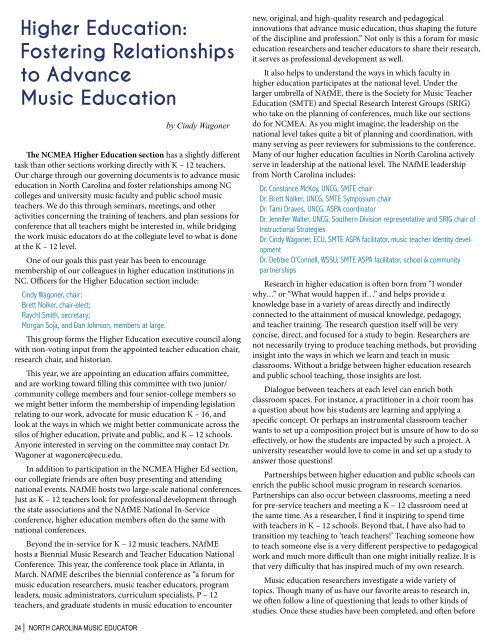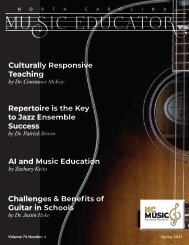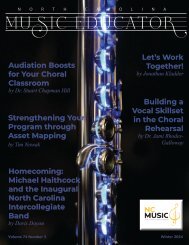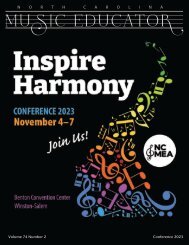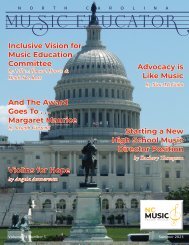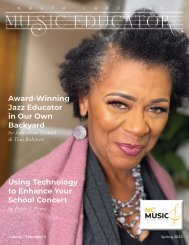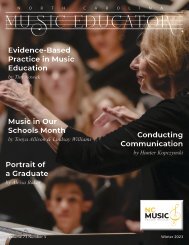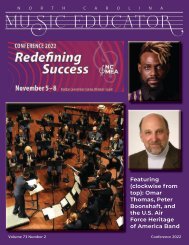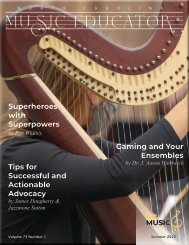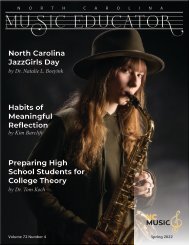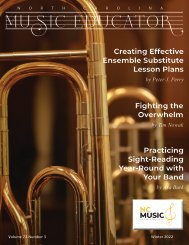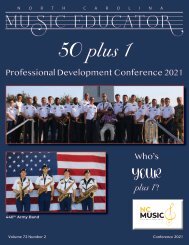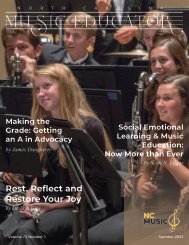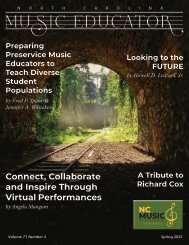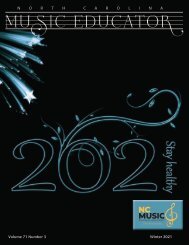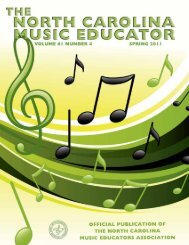NC Music Educator Spring 2018
North Carolina Music Educators Association Journal Spring 2018
North Carolina Music Educators Association Journal Spring 2018
Create successful ePaper yourself
Turn your PDF publications into a flip-book with our unique Google optimized e-Paper software.
Higher Education:<br />
Fostering Relationships<br />
to Advance<br />
<strong>Music</strong> Education<br />
The <strong>NC</strong>MEA Higher Education section has a slightly different<br />
task than other sections working directly with K – 12 teachers.<br />
Our charge through our governing documents is to advance music<br />
education in North Carolina and foster relationships among <strong>NC</strong><br />
colleges and university music faculty and public school music<br />
teachers. We do this through seminars, meetings, and other<br />
activities concerning the training of teachers, and plan sessions for<br />
conference that all teachers might be interested in, while bridging<br />
the work music educators do at the collegiate level to what is done<br />
at the K – 12 level.<br />
One of our goals this past year has been to encourage<br />
membership of our colleagues in higher education institutions in<br />
<strong>NC</strong>. Officers for the Higher Education section include:<br />
Cindy Wagoner, chair;<br />
Brett Nolker, chair-elect;<br />
Raychl Smith, secretary;<br />
Morgan Soja, and Dan Johnson, members at large.<br />
by Cindy Wagoner<br />
This group forms the Higher Education executive council along<br />
with non-voting input from the appointed teacher education chair,<br />
research chair, and historian.<br />
This year, we are appointing an education affairs committee,<br />
and are working toward filling this committee with two junior/<br />
community college members and four senior-college members so<br />
we might better inform the membership of impending legislation<br />
relating to our work, advocate for music education K – 16, and<br />
look at the ways in which we might better communicate across the<br />
silos of higher education, private and public, and K – 12 schools.<br />
Anyone interested in serving on the committee may contact Dr.<br />
Wagoner at wagonerc@ecu.edu.<br />
In addition to participation in the <strong>NC</strong>MEA Higher Ed section,<br />
our collegiate friends are often busy presenting and attending<br />
national events. NAfME hosts two large-scale national conferences.<br />
Just as K – 12 teachers look for professional development through<br />
the state associations and the NAfME National In-Service<br />
conference, higher education members often do the same with<br />
national conferences.<br />
Beyond the in-service for K – 12 music teachers, NAfME<br />
hosts a Biennial <strong>Music</strong> Research and Teacher Education National<br />
Conference. This year, the conference took place in Atlanta, in<br />
March. NAfME describes the biennial conference as “a forum for<br />
music education researchers, music teacher educators, program<br />
leaders, music administrators, curriculum specialists, P – 12<br />
teachers, and graduate students in music education to encounter<br />
new, original, and high-quality research and pedagogical<br />
innovations that advance music education, thus shaping the future<br />
of the discipline and profession.” Not only is this a forum for music<br />
education researchers and teacher educators to share their research,<br />
it serves as professional development as well.<br />
It also helps to understand the ways in which faculty in<br />
higher education participates at the national level. Under the<br />
larger umbrella of NAfME, there is the Society for <strong>Music</strong> Teacher<br />
Education (SMTE) and Special Research Interest Groups (SRIG)<br />
who take on the planning of conferences, much like our sections<br />
do for <strong>NC</strong>MEA. As you might imagine, the leadership on the<br />
national level takes quite a bit of planning and coordination, with<br />
many serving as peer reviewers for submissions to the conference.<br />
Many of our higher education faculties in North Carolina actively<br />
serve in leadership at the national level. The NAfME leadership<br />
from North Carolina includes:<br />
Dr. Constance McKoy, U<strong>NC</strong>G, SMTE chair<br />
Dr. Brett Nolker, U<strong>NC</strong>G, SMTE Symposium chair<br />
Dr. Tami Draves, U<strong>NC</strong>G, ASPA coordinator<br />
Dr. Jennifer Walter, U<strong>NC</strong>G, Southern Division representative and SRIG chair of<br />
Instructional Strategies<br />
Dr. Cindy Wagoner, ECU, SMTE ASPA facilitator, music teacher identity development<br />
Dr. Debbie O’Connell, WSSU, SMTE ASPA facilitator, school & community<br />
partnerships<br />
Research in higher education is often born from “I wonder<br />
why…” or “What would happen if…” and helps provide a<br />
knowledge base in a variety of areas directly and indirectly<br />
connected to the attainment of musical knowledge, pedagogy,<br />
and teacher training. The research question itself will be very<br />
concise, direct, and focused for a study to begin. Researchers are<br />
not necessarily trying to produce teaching methods, but providing<br />
insight into the ways in which we learn and teach in music<br />
classrooms. Without a bridge between higher education research<br />
and public school teaching, those insights are lost.<br />
Dialogue between teachers at each level can enrich both<br />
classroom spaces. For instance, a practitioner in a choir room has<br />
a question about how his students are learning and applying a<br />
specific concept. Or perhaps an instrumental classroom teacher<br />
wants to set up a composition project but is unsure of how to do so<br />
effectively, or how the students are impacted by such a project. A<br />
university researcher would love to come in and set up a study to<br />
answer those questions!<br />
Partnerships between higher education and public schools can<br />
enrich the public school music program in research scenarios.<br />
Partnerships can also occur between classrooms, meeting a need<br />
for pre-service teachers and meeting a K – 12 classroom need at<br />
the same time. As a researcher, I find it inspiring to spend time<br />
with teachers in K – 12 schools. Beyond that, I have also had to<br />
transition my teaching to ‘teach teachers!’ Teaching someone how<br />
to teach someone else is a very different perspective to pedagogical<br />
work and much more difficult than one might initially realize. It is<br />
that very difficulty that has inspired much of my own research.<br />
<strong>Music</strong> education researchers investigate a wide variety of<br />
topics. Though many of us have our favorite areas to research in,<br />
we often follow a line of questioning that leads to other kinds of<br />
studies. Once these studies have been completed, and often before<br />
a publication is written or accepted to a journal, a researcher will<br />
submit an abstract of the research to the conference call for peer<br />
review. Acceptance rates for conferences vary wildly, but it is most<br />
often very competitive to gain a spot for a presentation or a poster.<br />
Once acceptance is made, the researcher has to commit to attend<br />
the event. Though some universities still provide a modest amount<br />
of travel money to present research, many will attend the events<br />
while paying out of pocket for much of the cost.<br />
To provide insight into the kinds of conference presentations<br />
and poster sessions you might encounter at a conference, I have<br />
included a list of those in North Carolina who participated<br />
this past month at the NAfME Biennial Research and Teacher<br />
Education Conference in Atlanta, with a brief description of the<br />
presentation or poster they prepared.<br />
Presentations<br />
There are many kinds of presentations, from panel discussions<br />
or symposia, to individual presentations. These can last anywhere<br />
from 20 – 90 minutes, depending on the format.<br />
Dr. Tami Draves, U<strong>NC</strong>G, presented “Outsider Within”:<br />
Dana’s Story, a narrative inquiry. Draves explored the identity<br />
construction of Dana, a first-year music teacher, with regard<br />
to race, class, gender, and sexuality. The primacy of Dana’s low<br />
socioeconomic status emerged strongly. Her story may broaden<br />
our understanding of how social factors mediate students’<br />
experiences in music education.<br />
Dr. Connie McKoy, U<strong>NC</strong>G, participated in a panel where the<br />
participants discussed how their research points to a way forward<br />
in optimizing diversity, inclusivity, equity, and access in music<br />
education. She shared how her research on culturally responsive<br />
teaching in music points to new purposes, goals, and objectives for<br />
music education, transforming how we “do” music in American<br />
schools and how we prepare music educators.<br />
Dr. Evelyn Orman, U<strong>NC</strong>C, presented Virtual Reality Research<br />
in <strong>Music</strong> Education: Past, Present and Future. Virtual reality<br />
(VR) research in music education began almost two decades<br />
ago. Projected to be an $80 billion industry by 2025, VR is used<br />
nationally in K – 12 schools. Orman discussed the technological<br />
problems, research questions, methodologies, designs and analyses<br />
applicable to VR and other areas of music education research.<br />
Dr. David Teachout U<strong>NC</strong>G, presented A Model for Evaluating<br />
Teaching in Higher Education with Dr. Jeremy Lane from the<br />
University of Arkansas at Little Rock. Teaching quality in higher<br />
education is measured commonly with student evaluations of<br />
teachers via end-of-course surveys, though relying on only a<br />
singular data point is fraught with obvious problems. Alternatively,<br />
some advocate for a multifaceted portfolio approach to measure<br />
effectiveness. Teachout and Lane presented a synergistic collection<br />
of teaching tasks associated with student learning and ways to<br />
assess them.<br />
Dr. Andrea VanDeusen, ECU, presented Pre-Service <strong>Music</strong><br />
Teachers’ Perceptions of Racial and Cultural Difference. She shared<br />
data from a case study of pre-service music teachers’ experience in<br />
the local community during a week-long cultural immersion field<br />
experience. Her participants described their feelings as they began<br />
to take the perspective of a cultural outsider, and she discussed the<br />
Pursue Your Passion - Find Your Path<br />
<strong>Music</strong> at Brevard College<br />
• World-class performance<br />
facility, breathtaking scenery,<br />
rigorous training and<br />
collaborative community<br />
• Degrees in <strong>Music</strong> & <strong>Music</strong><br />
Education (K-12 licensure)<br />
• NASM accredited since 1967<br />
For more information, contact:<br />
Dr. David Gresham, <strong>Music</strong> Major Coordinator<br />
at musicinfo@brevard.edu or<br />
visit www.brevard.edu/music<br />
Audition dates:<br />
• Monday, January 15, <strong>2018</strong><br />
• Saturday, February 10, <strong>2018</strong><br />
• Saturday, March 17, <strong>2018</strong><br />
(instrumental only)<br />
Generous financial aid packages are available for qualified students.<br />
24 | NORTH CAROLINA MUSIC EDUCATOR NORTH CAROLINA MUSIC EDUCATOR | 25


